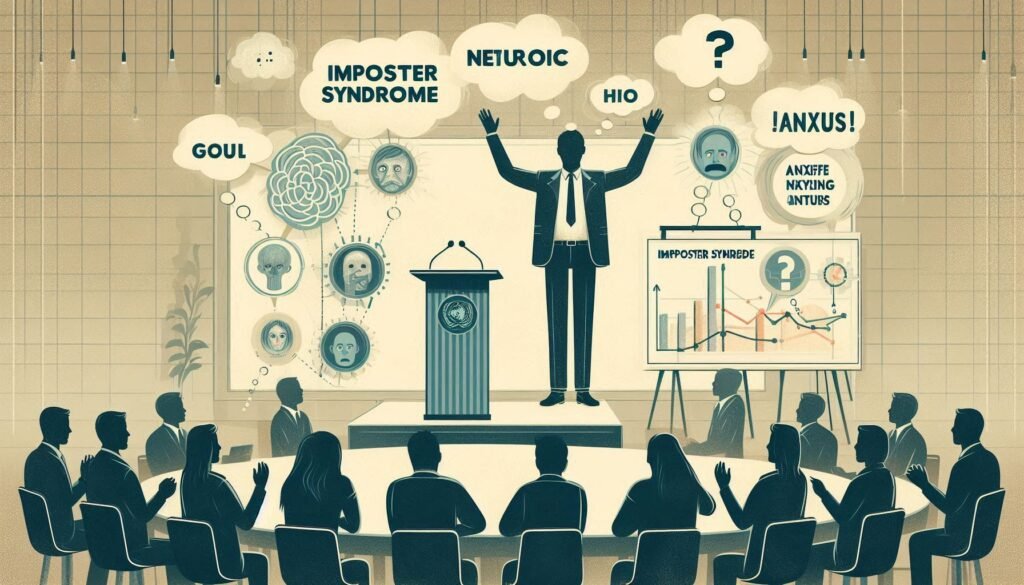In today’s fast-paced work environment, emotional health is often overlooked. One personality trait that can significantly impact workplace dynamics is neuroticism. Neurotic individuals may experience heightened anxiety and mood fluctuations, making it challenging to maintain positivity at work. However, integrating gratitude practices into the workplace can serve as a powerful antidote.
Gratitude has been linked to improved mental well-being, job satisfaction, and stronger interpersonal relationships among colleagues. Embracing these practices can be particularly beneficial for those with neurotic tendencies. By fostering an atmosphere of appreciation and recognition, organizations not only uplift their employees but also enhance overall productivity.
Navigating the intersection of neuroticism and workplace gratitude might seem complex, but understanding this relationship opens doors to creating a more harmonious work culture. Let’s explore how cultivating gratitude can transform challenges into opportunities for growth in any organization!

Understanding the Relationship Between Neuroticism and Gratitude
Neuroticism is characterized by emotional instability, anxiety, and mood swings. Individuals high in neuroticism often find it difficult to regulate their emotions, leading to increased stress levels and dissatisfaction at work. This emotional turbulence can overshadow positive experiences, making it hard for these individuals to engage in gratitude.
Gratitude, on the other hand, involves recognizing and appreciating positive aspects of life or the contributions of others. It promotes feelings of well-being and can counteract negative emotions. For those with neurotic traits, practicing gratitude may serve as a vital coping mechanism that helps mitigate feelings of insecurity or distress.
Research shows that expressing gratitude can shift focus from negative thoughts to more positive reflections. When neurotic individuals intentionally practice gratitude, they may begin to experience improved emotional stability over time.
Understanding this relationship highlights how fostering a culture of appreciation in workplaces can benefit not only individual employees but also enhance team cohesion by reducing anxieties associated with neurotic tendencies.
The Benefits of Gratitude Practices in the Workplace
Gratitude practices in the workplace offer a variety of benefits that enhance both individual and team dynamics. First, expressing gratitude can improve relationships among colleagues. When employees acknowledge each other’s contributions, it fosters a sense of belonging and strengthens teamwork.
Additionally, regular expressions of appreciation contribute to increased employee morale. A simple “thank you” can elevate mood levels, resulting in greater job satisfaction and motivation. This positivity often leads to higher productivity as employees feel valued and recognized.
Moreover, gratitude practices help reduce stress levels. When individuals focus on positive aspects rather than challenges or setbacks, their overall mental well-being improves. This shift can lead to decreased absenteeism due to burnout or anxiety.
Cultivating an environment where gratitude is commonplace encourages open communication. Employees are more likely to share ideas or seek support when they feel appreciated by their peers and leaders alike.
Challenges for Neurotic Individuals in Cultivating Gratitude
Neuroticism can pose unique challenges when it comes to cultivating gratitude. Individuals with high levels of neuroticism often experience heightened anxiety and negative emotions. These feelings can overshadow positive experiences, making it difficult for them to recognize moments worthy of appreciation.
Furthermore, their tendency to ruminate on adverse events may lead them to overlook the good in their lives. Instead of focusing on what they are grateful for, they might fixate on perceived failures or disappointments. This mental pattern creates a barrier to embracing gratitude.
Social interactions also become complicated for neurotic individuals. They may worry excessively about how others perceive them, which can inhibit their willingness to express appreciation openly. Fear of judgment can prevent meaningful connections that foster a culture of gratitude.
Chronic self-criticism often accompanies neurotic traits. Those who struggle with self-esteem issues find it hard to acknowledge external positives without questioning their worthiness or significance in the workplace.
Implementing Personal Gratitude Rituals for Neurotic Employees
Creating personal gratitude rituals can significantly benefit neurotic employees. These practices help individuals focus on positive experiences, countering their tendency to dwell on negatives. Simple daily habits can foster a more optimistic outlook and enhance emotional resilience.
Encouraging neurotic team members to set aside time for gratitude is essential. Allocating five minutes each morning or evening for reflection can be transformative. During this time, they might consider specific people or moments that brought joy or support throughout the day.
Moreover, incorporating reminders in their workspace aids consistency. Sticky notes with affirmations or encouraging quotes can serve as visual cues to shift focus toward appreciation rather than anxiety.
Group activities also reinforce personal rituals while fostering connection among colleagues. Team members could share what they’re grateful for during meetings, creating an atmosphere of shared positivity and reducing feelings of isolation often experienced by those high in neuroticism.
Gratitude Journaling: A Tool for Shifting Perspective in the Workplace
Gratitude journaling serves as a powerful tool for shifting perspectives, especially in the workplace. By encouraging individuals to focus on positive experiences and expressions of appreciation, it helps counterbalance negative thoughts often associated with neuroticism. The act of writing down what one is grateful for can foster an optimistic mindset.
Incorporating this practice into daily routines allows employees to cultivate awareness around their achievements and strengths. This shift not only enhances individual well-being but also contributes positively to team dynamics. A gratitude journal can serve as a reminder that even small victories hold value.
Moreover, gratitude journaling encourages reflection on interactions with colleagues. Through this lens, neurotic individuals may find common ground and build connections they previously overlooked. It creates opportunities for deeper engagement within the work environment.
Employers can support this initiative by providing resources or dedicated time during work hours. When organizations prioritize gratitude journaling, they pave the way for healthier mindsets among all employees.
Expressing Appreciation: Overcoming Barriers for Neurotic Individuals
Neurotic individuals often struggle with expressing appreciation due to their heightened sensitivity to criticism and fear of vulnerability. This internal dialogue can create a barrier, making it difficult for them to acknowledge the contributions of others. They may worry that showing gratitude could lead to judgment or misunderstandings.
To encourage neurotic employees, creating a safe environment is essential. Fostering open communication can help alleviate fears associated with expressing feelings. Regular team-building activities can also strengthen bonds among colleagues, encouraging more authentic interactions.
Another effective approach is providing structured opportunities for appreciation sharing. This could take the form of weekly meetings dedicated solely to recognizing achievements and positive behaviors within the team. By normalizing these discussions, neurotic individuals may feel less anxious about participating.
Modeling gratitude from leadership sets a powerful example. When leaders openly express appreciation for their teams, it creates an atmosphere where all employees feel empowered to do the same without fear or hesitation.
The Role of Leadership in Promoting Gratitude Culture
Leadership plays a crucial role in establishing a culture of gratitude within the workplace. When leaders model grateful behavior, it sets a powerful example for employees. This can create an environment where appreciation becomes part of daily interactions.
Leaders should actively express gratitude towards their team members. A simple “thank you” can go a long way in fostering employee morale and motivation. Recognizing individual contributions reinforces positive behaviors and encourages others to do the same.
Additionally, leaders must encourage open communication about feelings and experiences related to gratitude. Facilitating discussions around what appreciation looks like helps demystify the practice for neurotic individuals who may struggle with expressing emotions.
Promoting initiatives that celebrate accomplishments is also vital. Whether through team gatherings or recognition programs, these moments highlight collective efforts and strengthen bonds among colleagues, further embedding gratitude into the company culture.
Gratitude Interventions: Tailoring Practices for Neurotic Team Members
Gratitude interventions can be particularly beneficial for neurotic team members, who may struggle with anxiety and negative emotions. Tailoring these practices to suit their unique needs is essential. Understanding individual triggers and stressors allows leaders to create a supportive environment where gratitude can flourish.
One effective approach is to introduce small, manageable gratitude exercises that align with personal comfort levels. For example, starting with simple prompts like “What went well today?” encourages reflection without overwhelming them. This gradual introduction helps build confidence in expressing gratitude.
Group activities also play a vital role in fostering connections among team members. Creating a safe space for sharing positive experiences reinforces community bonds while allowing neurotic individuals to witness the benefits of gratitude firsthand.
Incorporating regular feedback on these practices helps refine them over time. By remaining flexible and responsive to employee needs, organizations can cultivate an authentic culture of appreciation that resonates with everyone, especially those prone to higher levels of neuroticism.
Measuring the Impact of Gratitude Practices on Job Satisfaction and Performance
Gratitude practices in the workplace can significantly influence job satisfaction and performance. Numerous studies indicate that employees who regularly engage in gratitude exercises report higher levels of happiness and contentment at work. This emotional uplift often translates into increased motivation and productivity.
Furthermore, measuring the impact of these practices can be achieved through various methods. Surveys assessing employee well-being before and after implementing gratitude initiatives provide valuable insights. Metrics such as turnover rates, absenteeism, and overall engagement levels also serve as indicators of how gratitude affects workplace dynamics.
Performance metrics are equally important. Teams that embrace gratitude tend to collaborate more effectively, leading to enhanced project outcomes. Positive recognition fosters a culture where individuals feel valued, encouraging them to contribute their best efforts consistently.
Organizations should consider utilizing both qualitative feedback from employees about their experiences with gratitude practices alongside quantitative data for a comprehensive evaluation. This dual approach creates a clearer picture of how fostering gratitude influences overall workplace morale and effectiveness.
Integrating Gratitude into Performance Reviews and Feedback Processes
Integrating gratitude into performance reviews and feedback processes can significantly enhance workplace culture. By acknowledging the hard work and contributions of neurotic employees, organizations create an environment where everyone feels valued.
When managers incorporate expressions of gratitude in their feedback, it fosters a sense of belonging among team members. This practice encourages neurotic individuals to view criticism more constructively instead of taking it personally.
Additionally, recognizing achievements during evaluations helps build resilience in those who may struggle with self-doubt or anxiety related to their performance.
Moreover, setting clear expectations for regular appreciation reinforces positive behaviors within teams. When leaders model gratitude consistently, it creates a ripple effect throughout the organization.
Designing performance reviews that emphasize both accomplishments and areas for growth ensures that employees feel supported rather than overwhelmed by deadlines or targets.
By integrating gratitude into these processes, businesses not only boost morale but also improve overall job satisfaction and productivity—a win-win situation for everyone involved.


